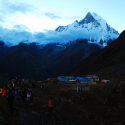Introduction of Annapurna base camp trek
Annapurna Base Camp Trekking route is one of the most popular and famous for travelers, also one of the easiest in Nepal as it is one with the most beautiful views. Although it is situated along the foothills of the Great Himalayan Range. Annapurna is the 10th tallest mountain in the world with an altitude of 8091m above sea level. The journey to the base camp is 110 km to reach an altitude of 4130m in 7- 8 days. Many endangered flora and fauna such as the snow leopards, Himalayan thars and tigers can be found in the region.
The total distance of the trek is of 110KM
Continue reading “How to prepare for Annapurna Base Camp Trek?”
Tags: Annapurna base camp trek cost, Annapurna base camp trekking, Annapurna base camp trekking guide, how to prepare for annapurna base camp trek

